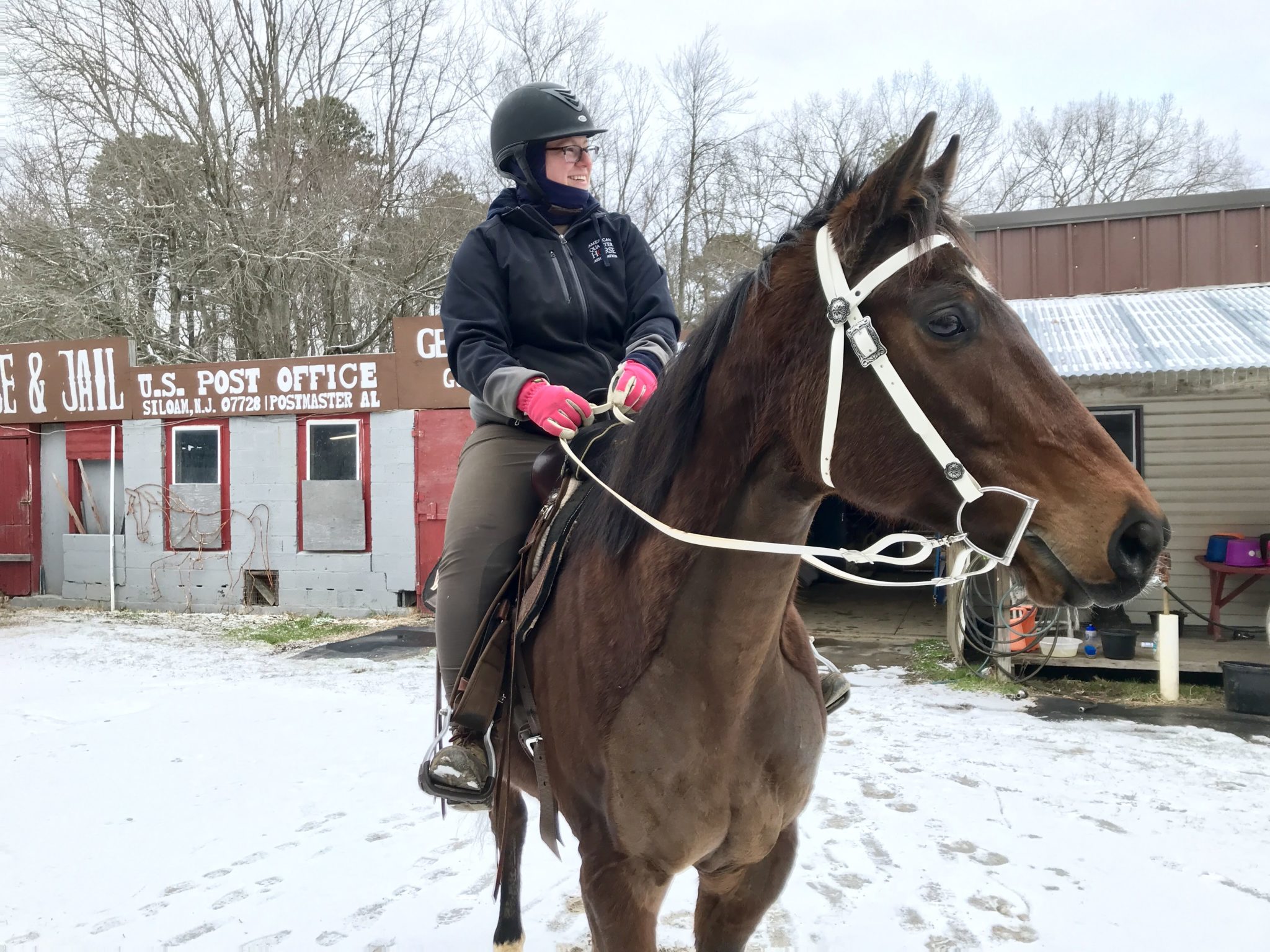Some people really REALLY hate the snow. You probably know exactly who I’m talking about… you might even be one of those people. I’m not. I actually… enjoy… the snow.
Call it a by-product of growing up on the New York-Ontario border, I really, truly, don’t mind the snow. It makes everything pretty, covers up the crap, and brings out my inner child just waiting for the next snow day. I also have the luxury of not needing to work outside all day every day so my outdoor time is, shall we say, voluntary. (Making my opinion one to be taken with a giant grain of salt for those who do and hate the snow and cold. I feel you.)
The weather this time of year makes everything, even the most simple tasks, more difficult. Water troughs freeze over, pulling the feed cart gets more difficult, mucking becomes a rather interesting game of “can it be raked up or is this going to pop off the ground and hit me in the face.” You get the picture.
But as some old wise man once said long before me: When the going gets tough, the tough get going.
In some small sense, that’s part of what I love about the snow and cold. It turns normally enjoyable work into a personal challenge for how frequently I can get to my horse-related endeavors. It makes it more difficult but sometimes, more satisfying. It also means accepting things that I can’t change… like the weather. Or whether or not my horse is a little less than perfect as a result of my own shortcomings.
One thing I can always stay in control of is how I work with my horse. Not how many times or how frequently, not how long, just how. How I work with my horses is always something within my control. Everything else from weather to how much time I can spend with my horses is an inconsistent variable that we’re always fighting against.
This whole idea got me thinking about something that I don’t think is explained very often but is certainly worth understanding.
Consistency v. Repetition
What’s the difference between consistency and repetition? Any guesses? Merriam? Webster?
We’re often talking about “being consistent” with our horses but just as often I think that can be misinterpreted as simply repeating the same thing over and over and over. That act alone doesn’t necessarily mean consistency.
Merriam-Webster defines the word consistent as “steady continuity: free from variation or contradiction,” while repetition is simply an act that’s repeated.
So what does this all mean? Well, it means that to be consistent does not just mean that something needs to be done with repetition every day. It means that to be consistent you have to be accurate. It means you control the how and that your work with the horse is “free from variation or contradiction.” It means that you approach your work with the same resolve and persistent attitude, confident leadership, and searching for opportunities to reward the horse every day, regardless of whether it’s a good day, a rainy day, a shitty day, or a snowy day.
Practice doesn’t make perfect. Perfect practice makes perfect. And I would be willing to bet dollars to donuts that most horses would take fewer sessions of perfect practice for a dozen sessions of imperfect practice.
Training horses in a consistent way tends to produce a very equitable human-horse relationship. By that I mean, you tend to get out what you put in. If you don’t have all the time in the world but your leadership and training remains consistent, then progress will still happen just maybe at a slower rate than those times that you can spend all day every day at the barn.
And that’s ok. So with this in mind on a cold, windy, and turning snowy weekend, my buddy Sure Prize and I set out for some work after a solid 5 days off. I didn’t have expectations and despite him losing his mind a few times over ghosts in the woods, we mostly picked up where we’d left off so it was a good day.
I haven’t been the most regular in training this winter. We’re lucky to get in 2-3 sessions each week. And that’s absolutely alright because we’re making the most of it. My approach, my consistency in handling him, riding him, hasn’t changed no matter how infrequent our training sessions may be.
And that’s ok. When I don’t get out to work the boy as often as I’d like, I try my best not to look at it as a reflection of myself, or that it’s a guarantee that we’re not going to pick up right where we left off.
Why? Because I try my damndest to be consistent with him when I do work with him. I pay closer attention to his response to cues and aids under saddle. I reward as soon as he’s answered my question correctly. I change the subject when he’s gotten through something difficult. This way, no matter what, we’re always building towards something — trust.
“Consistency is the true foundation of trust. Either keep your promises or do not make them.”
―
I don’t have to show up 7 nights a week to make progress or to be consistent. It’s not about scheduling more rides or more time at the barn. It’s about changing the quality of your time. It’s shaping your current practice into perfect practice.
Being aware and observant in how you lead, how long you persist, how quickly you reward, how cool you keep your attitude before you get frustrated in a way that affects the how of working with your horse… that all contributes to how consistent a horseperson you really are.
We may not be able to control the weather but we can always control our attitudes and our energy output around the horses. That kind of consistency is what makes you a trustworthy leader and partner.
Anna Blake’s blog has a great article on this exact subject. In it she says:
In the beginning, training is repetition. We ask for something, the horse tries a few things, and gets a release when he finds the right answer. We cue him, he steps back, and the cue stops. He learns in hindsight and then gives us the right answer when we ask because he likes it when the cue stops. Simple success.
The problem is that we want more. More cues, more obedience, more good feelings. Most horses oblige to a point. Then we want bigger progress and get frustrated when he doesn’t keep up. A cue that makes sense to you leaves him blank. Or something changes; the routine gets altered and the two of you lose rhythm. Or the horse is distracted when we ask and we startle him with a correction. Somehow, things come apart. Because they always do….
Riding more often, repetition, doesn’t make a horse better. If that was true, those old sainted lesson ponies would be in the Olympics…
Consistency isn’t about drilling the same question, judging right and wrong, punishing or rewarding. Consistency is an ever-evolving mentality that stays present with energy and an openness. It’s rewarding his curiosity with your creativity; a witty repartee of cues and releases that feels like laughter between equals. It’s knowing that he’ll give the best answer if you focus on asking the question in the best way.
It’s controlling the how you work with your horse. It also means being aware of one other crucial aspect: knowing when to change the subject. Not how many times you can do it or how long. It’s having a conversation and shaping it into a positive one, no matter how many times you needed to change the subject or how nasty it might have gotten in between. It’s about how you handle those situations that define you and your equine relationships.
So no matter what life throws at you – snow, sleet, blistering winds, or just a bad day – don’t be discouraged. Be consistent in how you go about your work, even if that’s only once or twice a week and it feels like you’ve only been taking baby steps forever. Persistence always pays off, almost as much as having a good attitude about it. Keep practicing, as perfectly as you can make it, taking what the horse gives you and knowing when to take good for good enough. Start fresh with the same attitude every time no matter how discouraged you might be and success is sure to follow.

